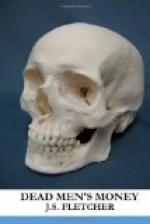CHAPTER XXXVI
GOLD
There was quite a company of men came up the stair with Murray, crowding, all of them, into the room, with eyes full of astonishment at what they saw: Mr. Lindsey and Mr. Gavin Smeaton, and a policeman or two, and—what was of more interest to me—a couple of strangers. But looking at these more closely, I saw that I had seen one of them before—an elderly man, whom I recognized as having been present in court when Carter was brought up before the magistrates; a quiet, noticing sort of man whom I remembered as appearing to take great and intelligent interest in the proceedings. And he and the other man now with him seemed to take just as keen an interest in what Chisholm and I had to tell; but while Murray was full of questions to both of us, they asked none. Only—during that questioning—the man whom I had never seen before quietly lifted the hanging which I had spread over Hollins’s dead body, and took a searching look at his face.
Mr. Lindsey drew me aside and pointed at the elderly man whom I remembered seeing in the police court.
“You see yon gentleman?” he whispered. “That’s a Mr. Elphinstone, that was formerly steward to old Sir Alexander Carstairs. He’s retired—a good many years, now, and lives the other side of Alnwick, in a place of his own. But this affair’s fetched him into the light again—to some purpose!”
“I saw him in the court when Carter was before the bench, Mr. Lindsey,” I remarked.
“Aye!—and I wish he’d told me that day what he could have told!” exclaimed Mr. Lindsey under his breath. “But he’s a cautious, a very cautious man, and he preferred to work quietly, and it wasn’t until very late tonight that he came to Murray and sent for me—an hour, it was, after you’d gone home. The other man with him is a London detective. Man! there’s nice revelations come out!—and pretty much on the lines I was suspecting. We’d have been up here an hour ago if it hadn’t been for yon storm. And—but now that the storm’s over, Hugh, we must get Maisie Dunlop out of this; come up, now, and show me where she is—that first, and the rest after.”
We left the others still grouped around the dead man and the boxes which had been brought up from the car, and I took Mr. Lindsey up the stairs to the room in the turret which had served Maisie for a prison all that weary time. And after a word or two with her about her sore adventures, Mr. Lindsey told her she must be away, and he would get Murray to send one of the policemen with her to see her safe home—I myself being still wanted down below. But at that Maisie began to show signs of distinct dislike and disapproval.
“I’ll not go a yard, Mr. Lindsey,” she declared, “unless you’ll give me your word that you’ll not let Hugh out of your sight again till all this is settled and done with! Twice within this last few days the lad’s been within an inch of his life, and they say the third time pays for all—and how do I know there mightn’t be a third time in his case? And I’d rather stay by him, and we’ll take our chances together—”




